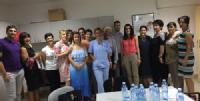Montenegro
Sodium and potassium intake, knowledge attitudes and behaviour towards salt consumption, amongst adults in Podgorica, Montenegro
Lanfranco D’Elia, Mina Brajović, Aleksandra Klisic, Joao Breda, Jo Jewell, Vuk Cadjenović and Francesco P Cappuccio on behalf of Salt Consumption Survey in Montenegro Study Group.
Nutrients 2019; 10: 11, 160 (doi:10.3390/nu11010160)
Abstract
Excess salt and inadequate potassium intakes are associated with high cardiovascular disease (CVD). In Montenegro, CVD is the leading cause of death and disability. There is no survey that has directly measured salt and potassium consumption in Montenegro. The aim is to estimate population salt and potassium intakes and explore knowledge, attitudes and behaviour (KAB), amongst the adult population of Podgorica. Random samples of adults were obtained from primary care centres. Participants attended a screening including demographic, anthropometric and physical measurements. Dietary salt and potassium intakes were assessed by 24h urinary sodium (UNa) and potassium (UK) excretions. Creatinine was measured. KAB was collected by questionnaire. Six hundred and thirty-nine (285 men, 25-65 years) were included in the analysis (response rate 63%). Mean UNa was 186.5 (SD 90.3) mmol/day, equivalent to 11.6g of salt/day, and potassium excretion 62.5 (26.2) mmol/day, equivalent to 3.2g/day. Only 7% of them had a salt intake below the WHO recommended target of 5g/day, and 13% ate enough potassium (>90 mmol/day). The majority (86%) knew that high salt causes ill-health. However, only 44% thought it would be useful to reduce consumption. Salt consumption is high, and potassium consumption is low, in men and women living in Podgorica.
Launch of the results of the National Survey on
salt and potassium consumption in Montenegro
20th July 2018, Podgorica, Montenegro
The official presentation of the results of the "National 24h urinary sodium and potassium excretions, and salt and potassium consumption, of adults in Montenegro" took place at the Hotel Hilton in Podgorica, Montenegro, on 20th July 2018. It was organized by Ms Mina Brajovic (W.H.O. Country Office), with the participation of Dr Miro Knezevic (Ministry of Health), Mrs Radana Damjanovic (Ministry of Agriculture), Prof Francesco P Cappuccio (W.H.O. Collaborating Centre for Nutrition of the University of Warwick), Ms Merisa Cekic (Ministry of Agriculture) and Dr Borko Bajic (National Institute of Public Health).
Training Meeting for a National Survey on Salt Consumption
18th August 2017
Podgorica, Montenegro
The W.H.O. Collaborating Centre of the University of Warwick is providing technical support to the National Centre of Public Health of Montenegro, as part of its remits to support the W.H.O. Region for Europe in the implementation of population salt reduction programmes in Member States. The technical support will help define the methodology and the tools for a national survey on salt intake in Montenegro, providing training for national co-ordinators and support during data collection, process and analysis.
After months of preparation and discussion among the Ms Mina Brajovic, Montenegrian officer for WHO, the WHO Office for Europe and the University of Warwick WHO Collaborating Centre, the first training meeting was held in Podgorica on 18th August 2017 and was attended by Prof Francesco P Cappuccio from the W.H.O. Collaborating Centre, Dr Aleksandra Klisic, Project Coordinator from the Public Health Care Centre in Podgorica, Mr Vuc Cadjenovic, Statistical Consultant, WHO, and many representatives of doctors and nurses from the 10 Family Health Centres selected to recruit participants for a national survey of salt consumption, the first ever to be performed in Montenegro (see programme).

Participants to the first training day in Podgorica, Montenegro


Salt intake (g/day) in Podgorica, Montenegro (2017)
| Mean | SD | |
| Men (n=285) | 13.9 | 6.3 |
| Women (n=354) | 9.9 | 4.3 |
| All (n=639) | 11.6 | 5.6 |
Method: 24h urine collection
Initiative to reduce salt in food kicks off in Montenegro 2013
WHO Country Office, Montenegro
Serdara Jola Piletica 8 (spr.II/st.10)
Podgorica 81000
Tel.: +382 20244809, +382 20244810
Fax: +382 20244408

